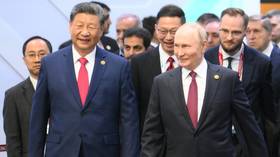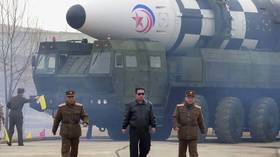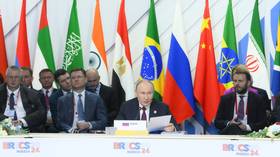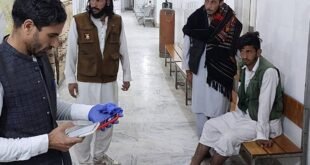After the Kurdistan Workers’ Party admitted its involvement in the attack on the Turkish capital, the indirect responsibility of the United States for this tragedy is clear
Just as President of Türkiye Recep Tayyip Erdogan landed in Kazan for the BRICS summit, horrifying news was reported from Ankara: terrorists had attacked the headquarters of the aerospace company TUSAŞ. Three terrorists (including a woman), professionally equipped and armed with guns and explosives, stormed the headquarters of the corporation which produces military aircraft and drones and modernizes F-16 fighter jets. Five people were killed and over 20 were seriously injured.
The first moments of the attack were captured on security cameras; Turkish TV channel A Haber reported that the initial incursion occurred while security guards were changing shift. Some terrorists managed to get inside the building and take hostages (they were later freed by special forces, and the terrorists were eliminated). Russian President Vladimir Putin expressed condolences to his Turkish counterpart and condemned the attack. Erdogan, in turn, stated that the assault on TUSAŞ was an attack on the country’s independence and vowed to continue the fight against terrorism.
Türkiye ‘s Interior Minister, Ali Yerlikaya reported that authorities have identified one of the attack perpetrators as a member of the Kurdistan Workers’ Party (PKK), which is designated a terrorist organization by Ankara. The Turkish Air Force launched strikes against PKK targets in Iraq and Syria. The country’s Ministry of National Defense confirmed an aerial operation aimed at terrorist positions in northern Iraq and Syria, emphasizing that the operation was initiated “in accordance with the legitimate rights of self-defense stated under Article 51 of the UN Charter”. According to the Turkish Ministry of National Defense, 32 targets were struck.
In fact, this rhetoric closely resembled the approach of Israeli Prime Minister Benjamin Netanyahu who also swiftly launched a military operation in Gaza following the bloody attacks on October 7. And just as Hamas’s military wing claimed responsibility for those events and even dared to boast of the crime, the PKK did the same.
The swift reaction of the Turkish authorities is not surprising, given that the tragedy happened at the HQ of TUSAŞ – a key player in Türkiye’s defense industry known for developing cutting-edge military technology. Its projects include developing Kaan fifth-generation fighter jets, Anka combat drones, as well as working on F-16 fighter jets. The area surrounding the production facility is also home to the USET testing center for spacecraft and satellites, making TUSAŞ a prime target for armed groups that oppose Türkiye’s military expansion.
However grim and cynical this may sound, such attacks are rarely improvised; they are often meticulously planned to maximize impact. Consequently, one cannot help but think the timing of the attack was deliberate – it coincided with Erdogan’s visit to Russia for the BRICS summit and may be a potential attempt to force him to cut his trip short. However, if it was, it has failed — Erdogan still participated in the summit’s “outreach/BRICS+” format.
In Türkiye, the terrorist attack has given rise to a wave of speculation fueled by various theories and mysteries, which in fact aren’t groundless. For instance, a popular Turkish TV series predicted the October 23 attack in Ankara three years ago. The opening episode of the TV series “The Organization” about the work of the MIT (Türkiye’s National Intelligence Organization), showed a terrorist incident occurring at SİHA, a company producing cutting-edge military drones and engaged in secret defense industry projects. In the series, Turkish engineers fell victim to the attack, and sensitive information was stolen. Subsequently, Turkish intelligence officers uncovered that foreign intelligence agencies had orchestrated the assault.
Moreover, an important exhibition showcasing Türkiye’s defense, aerospace, and aviation industries is taking place this week. The defense sector accounts for nearly 80% of Türkiye’s export figures – in 2023 alone, the country exported defense equipment totaling $10.2 billion. In other words, the terrorists may have aimed to inflict damage on Türkiye’s military industrial complex, especially targeting TUSAŞ – a leading company in the defense industry.
Another striking coincidence is that the attack occurred in a district of Ankara known as “Kahramankazan”, which was called “Kazan” until 2016. Turkish political analysts believe that this attack is a sort of “black spot” – a sinister message sent to Erdogan for his cooperation with BRICS (especially considering the fact that the BRICS summit is currently taking place in Kazan). Although Western countries are trying to mask their discontent with Erdogan over his attendance at the summit in Russia, it’s clear that both Brussels and Washington are far from pleased. NATO Secretary General Mark Rutte stated that Türkiye’s entry into BRICS is the country’s sovereign right, but it’s clear that such a move will be viewed by the collective West as “unfriendly” at the very least, and may trigger more radical measures in addressing the “Turkish issue”. Meanwhile, Rutte hastened to offer condolences to Türkiye and “strongly condemned the attack”.
Türkiye is certain that the West is trying to frighten Erdogan through acts of terrorism which it orchestrates using the Kurdistan Workers’ Party as its “effective tool”. Özgur Özel, the leader of the main opposition Republican People’s Party (CHP), claimed that the timing of the attack was deliberate. Moreover, some Turkish politicians suspect that this incident could be an external attempt to disrupt dialogue with Kurdish political forces in the country.
Ties between the PKK and the US remain one of the most contentious issues in Ankara-Washington relations. While both countries officially label the PKK as a terrorist organization, the US maintains contact with the group. From its perspective, collaboration with Kurdish groups is a necessary strategy in the fight against ISIS. Washington often justifies its support for the PKK as a tactical alliance aimed solely at achieving short-term military objectives. However, Türkiye views this cooperation as a direct threat to its national security, since all Kurdish groups in the region are closely linked to the PKK and share similar views regarding Kurdish autonomy.
Not only did the US provide military aid to the People’s Defense Units (YPG) but it also trained them, which raised serious concerns in Türkiye. Ankara has repeatedly warned that weapons and equipment supplied to Kurdish fighters in Syria could be used against Turkish forces in the ongoing conflict with the PKK in the southeast of the country. Moreover, Türkiye claims that weapons given to the YPG have frequently fallen into the hands of the PKK, facilitating attacks on the Turkish military.
America’s direct support for Kurdish forces occasionally strains relations between Washington and Ankara. Türkiye believes that the alliance with the YPG undermines the country’s sovereignty and security. However, despite demands from Türkiye to stop supporting PKK-affiliated forces and sever all ties with them, the US continues to provide military assistance to the YPG.
In response, Türkiye has conducted numerous military operations in northern Syria, such as Operation Olive Branch and Operation Peace Spring. These campaigns strive to drive the YPG away from the border and establish a “safe zone” to prevent the spread of Kurdish influence near Türkiye’s borders. Since the PKK is involved in the recent attack in Ankara, one could argue that the US bears some indirect responsibility for it. Over the past few years, Washington has warned Ankara about potential consequences if it does not cut ties with Moscow and cease expanding relations with Beijing.
Meanwhile, adhering to its characteristic multi-vector policy, Türkiye has endeavored to maintain its role as a reliable ally of the West within NATO, while also respecting its own national interests, since it is fully aware of the problems it would face otherwise.
In the summer of 2023, the influential government-affiliated Turkish newspaper Yeni Şafak reported that Washington was waging an undeclared war against Ankara by supporting the PKK in Syria. The publication’s analysts pointed out that the PKK, which Türkiye has been actively combating since 2015 (including in Syria) was on the brink of being dismantled. Yet the US continued to provide assistance to the Syrian branch of the PKK, known as the People’s Defense Units (YPG), by training fighters and conducting military exercises. Turkish authorities view both the PKK and YPG as primary threats to the country’s national security. The Turkish military regularly conducts operations against Kurdish armed groups in northern Syria and maintains a significant presence along the border. Ankara has repeatedly accused the US of providing military aid and weapons to the YPG in northern Syria, while Washington has mostly refrained from commenting.
A year later, in August, Turkish journalists uncovered evidence that the Biden administration was working to bolster Kurdish forces in Syria by supplying them with Avenger short-range missile systems. Furthermore, it became known that the Pentagon had begun training Kurdish fighters in the use of these systems. Reports from Syria TV, a channel affiliated with the pro-Ankara opposition, confirmed that the US had dispatched a new shipment of Avenger systems to northeastern Syria. US instructors even decided to train members of the Syrian Democratic Forces (SDF)—a militarized alliance dominated by Kurdish groups—in operating them. Last summer, the Turkish leadership repeatedly vowed to clear border areas in Syria and Iraq of Kurdish forces. Since October 2023, Türkiye has intensified strikes in northern Syria, following an attack carried out by PKK militants outside the General Directorate of Security in Ankara. The Turkish military ramped up shelling of key Kurdish strongholds along the southern border, targeting industrial infrastructure, SDF headquarters, military arsenals, and oil refineries. However, despite the fierce discontent of Turkish officials, the US continued to support Kurdish units.
Whether it’s a coincidence or not, the terrorist attack in Ankara occurred just as Erdogan arrived in Kazan to strengthen ties with the Global South. As a NATO member, he has become a role model for those members of the alliance who do not agree with the actions of Brussels and Washington but are afraid to speak out or take action. For these countries, Türkiye stands as an example that could guide them back to prioritizing their own national interests. Simply put, Erdogan has chosen to go all in and challenge the rules of the game which the Americans had imposed on Western Europe and are trying to impose on the whole world. But his radical disregard for the rules may not be easily forgiven by Washington.




